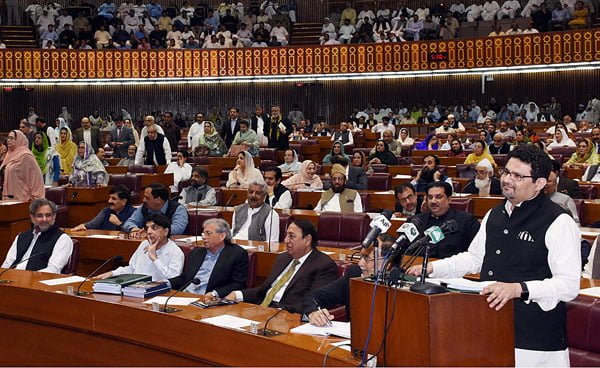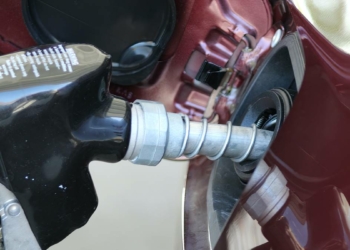ISLAMABAD, Apr 27 (APP):Federal Minister for Finance Miftah Ismail Friday unveiling a budget outlay of Rs 5.932 trillion, announced a growth oriented budget setting the GDP growth target for 2018-19 at 6.2 percent with the ever high proposed revenue generation at Rs 4435 billion against total expenditure of Rs 5246 billion.
Presenting the sixth budget of the Pakistan Muslim League(N) government before the general election, Miftah Ismail said the main targets include keeping inflation below 6 percent.
He said the government is set to achieve a growth target of 5.8 percent for the current year, the highest in the last 13 years putting Pakistan among the fastest growing economies.
The high growth rates over the last five years have produced unprecedented economic expansion. Size of the economy expanded from Rs 22,385 billion in FY 2013 to Rs 34,396 billion in FY 2018, while per capita income increased from 129,005 in 2013 to Rs 180, 204 billion, he added.
Last year, the government achieved GDP growth of 5.4 % which was the highest growth rate in the last 10 years. In contrast, the average GDP growth during the period 2008-12 was a paltry 2.8 percent per annum.
For next year, the federal gross revenue is estimated at Rs 5,661 billion. As compared to revised estimates of Rs 4992 billion in 2017-18, this is higher by 13.4 percent.
This includes FBR tax estimate of Rs 4,435 billion as compared to revised estimate of Rs 3,935 billion for current year.
Out of the total revenues, the provincial governments share is estimated to be Rs 2590 billion as compared to Rs 2316 billion revised estimates for 2017-18, showing an increase of 11.8 percent.
After transfer to provincial governments, the net revenue of the Federal Government is estimated at Rs 3,070 billion in 2018-19 as compared to revised estimates of Rs 2676 billion in the current financial year. Total federal expenditure for 2018-19 is budgeted at Rs 5932 billion, compared to the revised estimates of Rs 4857 billion for 2017-18, showing an increase of 8 percent.
Interest payments for 2018-19 have been budgeted at Rs 1620 billion against the revised budget of Rs 1526 billion for 2017-18. The defence budget is proposed at Rs 1100 billion against the revised budget of Rs 999 billion in the current year.
Total size of federal public sector development programme would be Rs 1030 billion against the revised estimates of Rs 750 billion. Provincial surplus is estimated at Rs 286 billion against revised estimate of Rs 274 billion. Budget deficit will be kept at 4.9 % of GDP as opposed to 5.5% of GDP in 2017-18.
While giving details of the past years performance, he said the agriculture sector showed the highest growth in the past 18 years of 3.8 percent. Industrial production grew by 5.8 percent. Services sector including banking, retail, transportation, showed a remarkable growth of 6.4 percent.
Inflation considered the biggest tax on poor people, was at average of 5 percent in the last five years, compared to 12 percent between 2008-13 percent. In nine months of this year, inflation was only 3.8 percent while food inflation was only 2 percent.
The fiscal deficit was contained below 5.5 percent of GDP while in 2013 the fiscal deficit was at 8.2 percent. In 2013, FBR tax collection was at 1,946 billion while for the current year, the revenue is projected to increase to Rs 3,935 billion.
The State Bank kept the policy rate at 5.75 percent in 2017, which was the lowest in many decades, allowing businesses and industry to grow and create jobs.
The government increased target of agriculture credit from Rs 315 billion in 2013 to Rs 1001 billion in 2018, For the next year, the target is being increased to Rs 1100 billion.
The minister also informed that the local film industry will be provided a fiscal package, including reduction in custom duty to 3 percent on the import of equipment, a rebate of 50 percent in income tax to companies investing in film projects and 50 percent tax rebate to income derived by foreign film makers.
Miftah said another new programme “100 100 100” will be launched to ensure 100% Pakistani children are enrolled in schools.
Other notable programmes include Rs 10 billion to address the problem of child stunting, Rs 35 billion for railways with a plan to increase the speed of trains from Peshawar to Karachi by 3 times from 55 km to 160 km by hour by 2021.
The government in five years added 12,230 megawatts to the national grid and will invest a further Rs 138 billion in power sector while Rs 310 billion will be spent on construction of motorways.
The minister told that Rs 44.7 billion is proposed for AJK and Gilgit Baltistan and Rs 24.5 for Federally Administered Tribal Areas (FATA).
Rs 10 billion has been approved to implement a ten year development plan for FATA and Rs 90 billion for rehabilitation of millions of people who had to leave their homes in the areas of military operations.
The government is enhancing PSDP allocations for Higher Education Commission to Rs 57 billion and will allocate Rs 37 billion for primary health programmes and Rs 10 billion for youth programme. Rs 137 billion are proposed for development of Gwadar port.
The government on Friday proposed reduction in various taxes including the income tax, sales tax and federal excise duty coupled with relief measures for the common man and filers through rationalization of taxes and duties in the federal budget for fiscal year 2018-19.
Minister for Finance Miftah Ismail while presenting the federal budget for FY 2018-19 said it was widely recognized that a substantial portion of untaxed money was parked in the real estate sector and the practice of under declaring the value of properties viz-a-viz their actual market value was rampant.
He said in a bid to address these challenges to ensure declaration of property transactions at actual market rate and discourage whitening of black money through investment in the real estate sector, the property transactions are proposed to be recorded on the value declared by the buyer and the seller.
The Finance Minister said, the FBR notified rates are proposed to be abolished, adding, at the federal level, a one percent adjustable advance tax from the purchaser on the declared value is proposed to replace the existing withholding tax on sellers and purchasers.
“It is proposed that the non filers may not be permitted to purchase property having declared value exceeding four million rupees,” he said, adding, the provinces have been requested to abolish the provincial rates for the collection of stamp duty and to collect a total of one percent tax under stamp duty and capital value tax on the value declared by the buyer and the seller.
The Finance Minister said in order to deter under-declaration and consequent loss of revenue, it is proposed that FBR may hold a right to purchase any property within six months of registration by paying a certain amount over and above the declared value which may be 100 percent in the fiscal year 2018- 2019, 75 percent in the fiscal year 2019-2020 and 50 percent in the fiscal year 2020-2021.
In order to implement the above measures enabling provisions are proposed to be incorporated in the Income Tax Ordinance, 2001, he said, adding, detailed procedure and the date of coming into force of the above measures are proposed to be notified later.
Minister for Finance Miftah Ismail proposed gradual reduction of 1% per annum from FY 2018-19 in super tax that was imposed in 2015 for rehabilitation of internally displaced persons and being charged @ 4% and 3% on banking and non-banking companies, respectively, having income greater than 500 million.
In the area of corporate tax, the Finance Minister said in consonance with the policy to reduce tax rates for individuals and Association of Persons (AOPs), the government has decided to likewise reduce corporate tax rates from 30% in tax year 2018 to 25% in tax year 2023.
The corporate tax rate will be 29% in tax year 2019 and will be reduced by 1% each year up to tax year 2023, he added.
The Finance Minister said in order to facilitate businesses in retaining earnings for investments, it is proposed that tax on undistributed profits may be reduced from 7.5% to 5% and the condition of distributing 40% after-tax profits may be reduced to 20%.
He said in order to promote Real Estate Investment Trust (REIT), the rate of tax on dividends issued to the unit holders by REIT is proposed to be reduced from the existing 12.5% to 7.5% in FY 2018-19.
The Finance Minister said the rate of withholding tax currently charged @ 6% on bank transactions from non-filers from non-filers is proposed to be reduced to 0.4% on a permanent basis.
He said considering inflation over the years it is proposed that the threshold for tax deduction on payment for services and goods be enhanced from the current Rs.10,000 and Rs.25,000 to Rs.30,000 and Rs.75,000,, respectively.
The Finance Minister said in order to promote setting up of deep conversion refineries it is proposed that such refineries with a capacity of minimum 100,000 barrels per day to be installed anywhere in Pakistan may be exempted from income tax for a period of 10 years.
Further, such exemption may also be extended to existing refineries in cases where capacity is expanded by installing deep conversion units with capacity of at least 100,000 barrels per day, he added.
The Finance Minister said in order to decrease cost of production it is proposed that the rate of tax on the import of coal currently payable at 5.5% for companies and 6% for persons other than companies may be reduced to 4%.
He said in order to increase the cost of doing business for non-filers higher rates of tax withholding for non compliant taxpayers are being proposed.
The withholding tax rates on sale of goods for non filers are proposed to be increased from existing 7% to 8% in the case of a company, and from existing 7.75% to 9% in non-corporate cases, he added.
The Finance Minister said due to enhancement of the taxable limit of income to Rs.1.2 million, the number of filers will be substantially reduced. This will also result in loss of revenue.
A nominal income tax may be imposed @ of Rs.1000 for income between Rs.400,000 to Rs.800,000 and @ of Rs.2000 for income between Rs.800,000 to Rs.1,200,000, he added.
The Finance Minister said in order to provide concession to printers/publishers of Holy Quran, exemption from Sales Tax and Customs Duty is proposed. This exemption will be available to federal and provincial governments as well as registered publishers of Holy Quran, he added.
Announcing exemption from value addition tax on import of LNG, he said it is proposed that the value addition tax @ 3% chargeable under Sales Tax Special Procedure Rules, 2007, on import of RLNG may be removed.
To address cash flow issues of Gas Distribution Companies, it is proposed that rate of sales tax may be reduced from 17% to 12% on import of LNG and supply of RLNG.
Finance Minister Miftah Ismail while unveiling exemption from sales tax for dairy, livestock and agriculture sectors said in order to promote agriculture growth, the rate of sales tax on various fertilizers including DAP, NP, NPK, SSP, CAN is proposed to be reduced from current 5% to 3% across the board.
It is further proposed that the rate of sales tax on supply of natural gas to fertilizers plant for use as feed stock, presently chargeable @ 10%, may be reduced to 5% to cater for cash flow issues of fertilizers manufacturers in view of reduction in rate of sales tax on fertilizers, he added.
Likewise, rate of sales tax on LNG imported by fertilizer manufacturers for use as feed stock is also proposed to be reduced from 5% to 0%.
To promote fish farming, the finance minister said 10% duty on sales tax on fish feed is being removed. Similarly, sales tax is being exempted for preparation of fans and animal feed of dairy farms, he added.
In addition, sales tax on agriculture machinery is proposed to be reduced from 7% to 5%. These proposed measures are expected to go a long way in promoting our agriculture, dairy, and livestock sectors, he added.
The Finance Minister said as personal computers and laptops are exempt from sales tax, in order to promote local assembling and manufacturing of laptops and computers, it is proposed that exemption on 21 types of computer parts imported by manufacturers may be granted.
He said stationery items were zero-rated under Fifth Schedule to the Sales Tax Act, 1990 which was subsequently withdrawn through Finance Act, 2016. It is proposed that zero-rating for stationery may be restored, to promote local stationery sector and reduce the prices of local stationery items, he added.
The Finance Minister said the supply of finished fabric to and by retailers, to end consumers, and other supplies of finished fabric including carpets, leather etc. are subject to sales tax @ 6%. Similar rate of 6% is applicable on import of ready to use articles of textile and leather.
In order to facilitate and promote automation in addition to revenue generation, it is proposed that the rate of sales tax @ 6% maybe retained on the sales for those persons who are integrated with FBR online systems. For others, rate of sales tax is proposed to be applied @ 9% for both supply of above referred goods and import of finished goods of textile and leather, he added.
He said presently value addition tax @ 3% under the Sales Tax Special Procedure Rules, 2007 is applicable on the import of second hand worn clothing and footwear. It is proposed to provide exclusion from value addition tax to the subject items. This would support lower income groups, he added.
The Finance Minister said to enhance documentation and base of sales tax, further tax is proposed to be increased from existing 2% to 3%. This will not only discourage undocumented economy, but it will also result in revenue increase, he added.
He said federal excise duty on locally produced cigarettes is proposed to be enhanced in respect of Tier-1, TIER-2 and TIER-3 to Rs 3964, Rs 1770 and Rs 848 per thousand cigarettes respectively.
Announcing Customs relief measures for livestock and dairy sectors, the Finance Minister said the livestock sector continues to be the largest sub-sector of Agriculture in Pakistan. It provides livelihood and employment to millions in the rural areas of the country and the commitment of our government to sustain it remains a key aspect element to alleviate poverty.
To sustain the growth in this vital sector of the economy and provide further relief, it is proposed that;- a. Customs Duty of 3% on import of bulls meant for breeding purposes be withdrawn. b. Presently available concessionary rate of Customs Duty on the import of feeds meant for livestock sector may be further reduced from 10% to 5% and fans meant for use in dairy farms be allowed at concessionary rate of 3% to members of the Corporate Dairy Association. This will substantially reduce their cost of inputs and boost further expansion, he added.
In respect of the poultry sector, the Finance Minister said, the concessionary rate of customs duty on import of growth promoters premix, vitamin premix, Vitamin B12 (Feed grade) and Vitamin H2 (Feed grade) is proposed to be further reduced from 10% to 5% for registered manufacturers of poultry feed.
The Finance Minister announcing measures for health sector said to tackle the problem of physical and mental stunting in children a food fortification program in collaboration with international partners is underway. Under this program, flour mills will mix critical micronutrients e.g. folic acid, vitamin B12, Zinc etc in the flour being produced for sale to general public.
However to ensure that the appropriate quantities of such micronutrients are being added to the flour, it is being proposed that 3% Customs Duty on import of the micro-feeder equipment be withdrawn, he added.
Similarly, to provide relief for cancer treatment in Pakistan, the Finance Minister said the government has exempted drugs from customs duties at import stage. However the sole exception was Tasigna on which customs duty @ 5% is proposed to be withdrawn.
It is also proposed that the rate of customs duty @11%, on corrective eyesight glasses be reduced to 3%, he added.
The Finance Minister said to provide incentive to exports an inter-ministerial review has identified certain raw materials, used in export related sectors. It is therefore proposed that the existing rate of Customs duty on raw materials falling under 104 PCT codes are being exempted whereas in respect of 28 PCT code the Customs Duty rates are being reduced.
The Finance Minister also announced some steps to curtail the discretionary powers of the tax collectors. As tax audit of a business involves considerable hassle and cost for the taxpayer, there are instances of taxpayers being subjected to multiple audits in successive years, he added.
He said in order to encourage compliant tax payers, selection for audit in respect of all three taxes; Income Tax, Sales Tax and Federal Excise Duty, has been made risk based and a case shall not be audited more than once in three years for each tax.
This limitation will apply to selection of audit by the commissioner as well as FBR. The concept of composite audit will also be introduced to ensure that audit of tax affairs under all tax laws is undertaken simultaneously to avoid inconvenience to the tax payers, he added.
The Finance Minister said this approach shall serve as an encouragement for compliant taxpayers, and decrease the cost of compliance with tax laws.
Previously grant of stay by the Commissioner (Appeals) was subject to payment of 25% of tax liability. The condition has now been relaxed, and the payment is proposed to be reduced to 10%, he added.
The Finance Minister said It is expected that this will provide substantial relief to taxpayers who are sometimes burdened with unrealistic tax demands.
Under the current law the decision of the ADRC is neither binding upon the FBR nor upon the taxpayer, he said, adding, it is proposed that composition of the members of ADRC maybe changed so that retired judge of a High Court and tax professionals may be included in the Committee in addition to representatives from FBR.
The Finance Minister said as per the Sales Tax Act, any commissioner or chief commission has authority to appoint staff at the premises of taxpayer, and monitor sales and production. Complaints have been received on the misuse of this authority.
Therefore, this authority is being withdrawn from commissioners and chief commissioners. Now only FBR will use this authority based on evidence of variations in sectoral averages, he added.


















